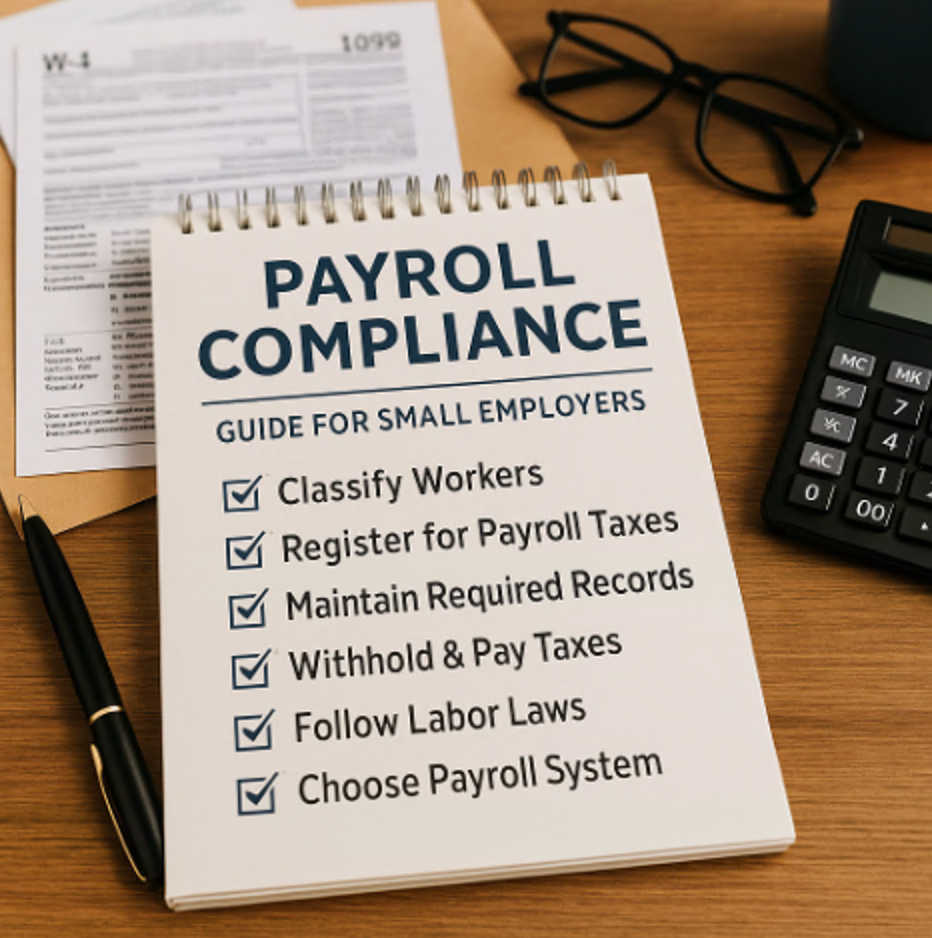A Simple Guide to Payroll Compliance for Small Employers
- R. Schaublin & Associates

- 4 days ago
- 2 min read
Updated: 16 hours ago

Why Payroll Compliance Matters
Payroll compliance for small employers means meeting all federal, state, and local requirements when compensating employees. Mistakes can result in penalties, audits, and legal troubles—something no small business owner wants to deal with.
Whether you have one employee or twenty, staying on top of payroll laws is essential to protecting your business and building employee trust.
Step 1: Accurately Classify Your Workers
The first step in payroll compliance is determining whether your workers are employees or independent contractors. Misclassification is one of the most common (and costly) mistakes small businesses make.
Employees require tax withholding and are covered under labor laws.
Independent contractors file their own taxes and typically receive a 1099 form.
✅ Tip: Use IRS Form SS-8 or the “ABC test” in your state to verify worker status.
Step 2: Register for Payroll Taxes
Before issuing a single paycheck, make sure you’ve registered with the appropriate agencies:
IRS: Get an Employer Identification Number (EIN)
State Tax Agency: Register for income tax withholding (if applicable)
State Unemployment Insurance (SUI): Required in most states
Local Tax Authorities: Some cities/counties have payroll taxes, too
Step 3: Maintain Required Records
Federal law requires you to keep specific payroll records for at least three years, including:
Employee name, address, and SSN
Hours worked
Pay rate and compensation details
Withholding records and W-4s
Timecards or clock-in systems
✅ At R. Schaublin & Associates, we help small employers set up compliant payroll systems using tools like uAttend and QuickBooks Enterprise.
Step 4: Withhold and Pay the Right Taxes
For employees, you must withhold:
Federal income tax (based on W-4)
Social Security and Medicare taxes (FICA)
State and local taxes, if applicable
You’ll also need to pay the employer’s portion of:
FICA taxes
Federal Unemployment Tax (FUTA)
State Unemployment Tax (SUTA)
✅ Don't forget to file Forms 941 quarterly and Form W-2 annually!
Step 5: Stay Up to Date with Labor Laws
In addition to taxes, compliance includes following wage and hour laws:
Minimum wage and overtime
Meal and rest breaks
Paystub and direct deposit rules
Final paycheck requirements upon termination
Step 6: Choose the Right Payroll System
Using an automated system like QuickBooks paired with uAttend can reduce errors, track hours accurately, and ensure tax payments and filings are on time.
We offer full payroll services that take the stress out of running payroll—whether you're a startup, a nonprofit, or a growing business.
Need Help With Payroll Compliance?
At R. Schaublin & Associates, we specialize in helping small businesses simplify payroll, avoid costly mistakes, and stay compliant—so you can focus on running your business.



留言